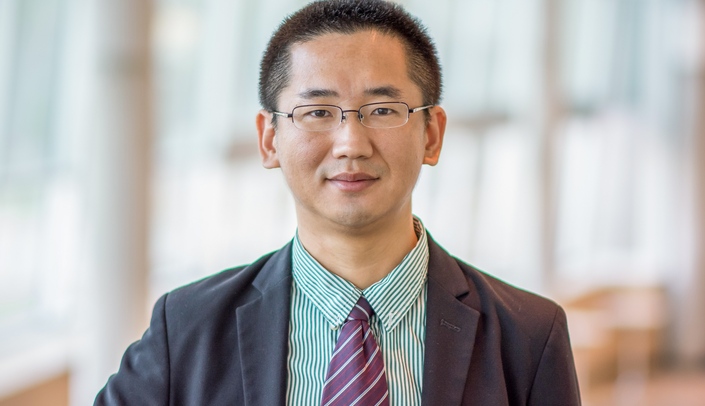Department of Anesthesiology Researcher Hanjun Wang, M.D., was recently awarded a research project grant (R01) from the National Institutes of Health (NIH) worth nearly $2.2 million.
The funding, which begins in April 2020 and runs through March 2024, allows Dr. Wang’s lab to focus on the interconnectedness of sensory nerves in the lung and heart. This R01 is Dr. Wang’s fourth active R01 funding from the NIH, and sixth overall. In January 2020, he and Cardiovascular Physiology Researcher Irving H. Zucker, Ph.D., received an R01 worth $2.3 million. Dr. Wang also currently has funding from a drug company. Dr. Wang’s current, multi-year funding in his laboratory tops $6.2 million.
Dr. Wang’s research largely focuses on sensory nerves in association with multiple organs and the role they play in reaction to disease or injury. His research can be divided into three major themes: the sensory nerve’s role in relation to the heart and kidneys, to the lungs and heart, and to the skeletal muscle and other organs. In all projects, researchers examine interventions that deactivate the sensory nerve in an attempt to enhance essential organ function or alleviate pain.
"As demonstrated by the impressive funding he has acquired, Dr. Wang is examining important questions that could change the way anesthesiologists around the world care for their patients," said Department of Anesthesiology Chair Steven J. Lisco, MD. "His research aligns perfectly with the department’s mission to deliver extraordinary clinical care and perform innovative research, and we are very fortunate to have him here."
Dr. Wang earned his medical and master of science degrees at Nanjing Medical University in China, then came to UNMC as a postdoctoral fellow in the Department of Cellular & Innovative Physiology in 2007. He joined that department as faculty in 2012, working closely with Dr. Zucker on cardiovascular research. In April, 2016, Dr. Wang joined the Department of Anesthesiology where he expanded his research to include the sensory nerve’s role in the lungs.
In February, Dr. Lisco appointed Dr. Wang as the Margaret R. Larson Professor of Anesthesiology. The five-year appointment began February 1, 2020, and runs through January 2025. The professorship will be renewable for another five-year term at that time, based upon satisfactory performance and evaluation.
"Receiving this honor is a great confidence for me, and it reflects the bravery of our chair," said Dr. Wang. "The support Dr. Lisco has given me is unbelievable, and I never could have been so successful without it. I’m looking forward to proving that he made a very wise decision."
Faculty who hold endowed positions get to spend the annual interest generated by the endowment fund in a manner specified by the fund originator. Dr. Wang put his endowment funds toward the purchase of a state-of-the-art air pollution tower, which will aid with current and future pulmonary research, and possibly provide opportunity to apply for Environmental Protection Agency grants. Most lung injury is chronic, such as from air pollution. This machine recreates moderate chronic lung injuries. Half of the funding for the $150,000 air pollution tower was provided by the College of Medicine.
"Our department has unique facilities," said Dr. Wang. "This device has not been widely used and is very novel. What we are working on now and in the recent past, it’s rare to provide this training."
Dr. Wang awarded $2.2 million grant, named Larson Professor of Anesthesia
- Written by Danielle Beebe
- Published Apr 21, 2020
